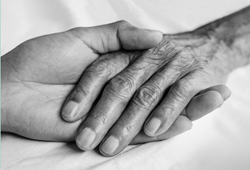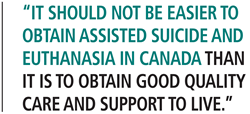Dear Friend,
Each human life is a gift from God. We know we are precious in His sight because He not only created us in His image – He sent His only Son to reconcile us to Himself because he deems us worthy of eternal life. That’s the unfathomable love we celebrate every Christmas.
Our belief in the worth and God-given dignity of every person compels us to cherish, respect and protect human life at all stages, regardless of age or ability. It compels us to vehemently oppose euthanasia and assisted suicide – practices that deliberately end a person’s life.
God calls us to respond to those who are experiencing vulnerabilities, including those who are ill or near the end of life, as Jesus did – with compassion (Matt 14:14). Palliative care that supports and cares for those who are suffering or terminally ill is something that we must vigorously support. Vulnerability, interdependence, and the need for care remind us of our shared humanity and help strengthen the bonds that build up healthy societies. Euthanasia and assisted suicide, on the other hand, abrogate our responsibility to care for one another.
In 2016, Canada legalized euthanasia and assisted suicide where specific conditions are met and with safeguards in place. But on October 5, 2020, the federal government introduced legislation (Bill C-7) which would amend the Criminal Code to expand the eligibility criteria for euthanasia and assisted suicide. The government hopes to pass the bill by mid-December.
Bill C-7 would remove the requirement that natural death be “reasonably foreseeable.” This could make euthanasia or assisted suicide available to anyone with a disability or an incurable or chronic condition (e.g. diabetes or arthritis), even when death is not imminent.
The “reasonable foreseeability of natural death” criteria for hastened death treats those living with chronic illness or disability with the same level of consideration, respect and inclusiveness as those not living with any health or physical limitations. The current limit affirms that they are equally valued members of society and should be afforded the same protection from active, intentional killing. To now make those living with chronic illness or disability eligible for euthanasia and assisted suicide only further stigmatizes their conditions and more deeply entrenches the discriminatory viewpoint that their lives are less important.
Bill C-7 also proposes other changes to current restrictions around euthanasia and assisted suicide. For people whose natural deaths are reasonably foreseeable, the bill would remove the current requirement for a 10-day reflection period between the time of consent and when the life is taken. In addition, Bill C-7 would allow patients in certain circumstances to make advance directives to waive the requirement for final consent before the lethal dose is administered. That a physician could possibly end the life of a patient who can no longer communicate whether they wish to be put to death should concern us deeply!

Current safeguards and eligibility requirements should be preserved, not eliminated. We believe that expanding access to doctor-assisted suicide and euthanasia will increase the risk of wrongful deaths and further undermine societal respect for life. We must uphold the dignity of life and protect those in vulnerable situations.
In response to Bill C-7, more than 50 religious leaders from across Canada, including the leaders of many EFC affiliate denominations, released an open letter to all Canadians in opposition to the bill.
As a society, we can do much better. With increasing societal pressure to advance “right to die” agendas, the EFC is encouraging governments to take more decisive actions on “right to life” and “right to care” issues – including investing much-needed resources toward ensuring access to life-affirming treatments and supportive care aimed at improving quality of life for those who are living with illness or disability. It should not be easier to obtain assisted suicide and euthanasia in Canada than it is to obtain good quality care and support to live.
Concerning end-of-life care, the EFC is urging the government to ensure more widespread access to good palliative care services and resources; increased training of more palliative care professionals; and support for palliative care providers and hospices. We need strong, clear conscience protection so that no health care provider is compelled to participate in hastened death against their deeply held beliefs.
High-quality, holistic palliative care can provide effective pain and symptom management. It also provides people with assured support to live their final days with dignity and in relative comfort, cared for physically, emotionally and spiritually. We believe this is compassionate care for those who are at the end of life!
It has been said that the health of a nation is the wealth of a nation. Access to compassionate, skilled and respectful care for every Canadian is essential for building a healthy society that is concerned for the well-being of every person. As Christ-followers, it is more important than ever that we do not give up working together to continue affirming and embracing the unconditional meaningfulness of life in all circumstances.
I want to express my heartfelt thanks to the many EFC supporters who, like you, have helped sustained us during these unprecedented times with your prayers and financial gifts. Even though donations are down this year, we remain committed to continuing the work that God has called us to do. We will be especially grateful for any gift you are able to make at this time in support of our work. May God bless you richly this Christmas season!
Sincerely,
Bruce Clemenger
President